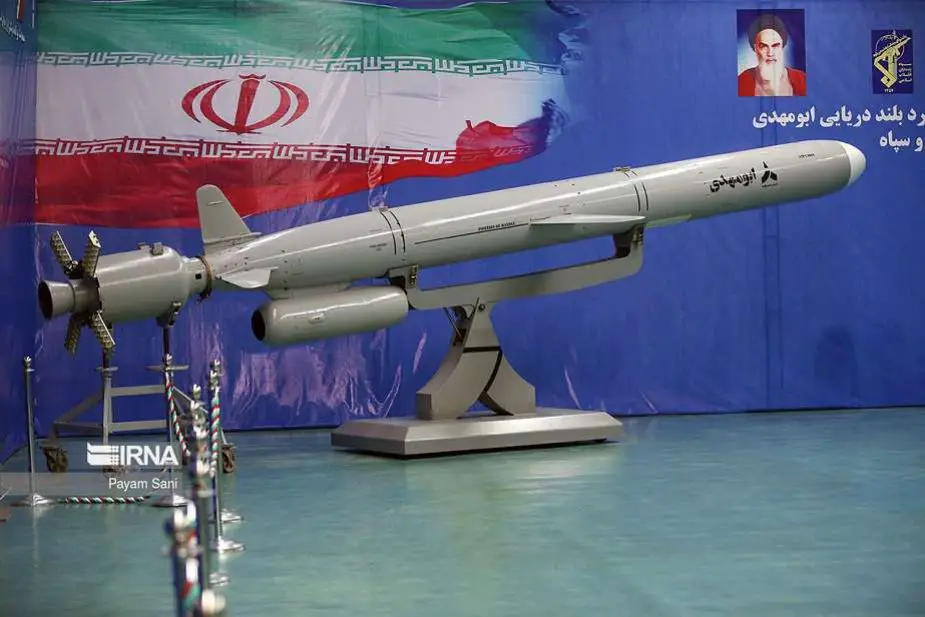Breaking News
Iran Delivers to its Naval Forces New Stealth Cruise Missile Undetectable to Enemy Radars.
According to information published by the Iranian Tasnim News Agency, on August 9, 2024, during an official ceremony, the IRGC (Islamic Revolutionary Guard Corps) Navy received several new military equipment including new cruise missiles, combat drones, reconnaissance and Strike Drones, electronic warfare systems, and naval radars. The new Iranian-made cruise missile integrates stealth features, making it undetectable to enemy radars.
Follow Army Recognition on Google News at this link

The Abu Mahdi is an Iranian-made long-range cruise missile, developed by the Iranian Aerospace Industries Organization. It can execute both anti-ship and land-attack missions with a range of up to 1,000 km. Unveiled in August 2022, it entered mass production in 2023. (Picture source: IRNA)
Citing Iranian News Agency Tasnim, Iran unveiled on August 9, 2024, a new class of naval cruise missiles that integrate advanced stealth technology, making them highly difficult to detect. These missiles, now part of the Islamic Revolutionary Guard Corps (IRGC) Navy, are equipped with radar-evading capabilities and high-explosive warheads capable of causing significant damage to large naval vessels, including destroyers.
Recently, Iran has made significant advancements in its naval cruise missile capabilities, unveiling several new models that demonstrate enhanced stealth, precision, and destructive power. One of the key developments is the integration of artificial intelligence (AI) into the "Abu Mahdi" cruise missile. This missile, which has a range exceeding 1,000 kilometers, is designed to be highly accurate and can be remotely guided after launch, making it a formidable addition to Iran's arsenal. The AI technology allows the missile to evade current missile defense systems, significantly enhancing its lethality and survivability.
In addition to the Abu Mahdi, Iran has introduced other new cruise missile types, such as the Talaeieh and Nasir models. These missiles are described as "fully smart" and are equipped with advanced radar-evading capabilities. They are designed to be undetectable by enemy defense systems, which, combined with their high-explosive warheads, makes them capable of sinking large naval vessels like destroyers.
Decades of international sanctions and embargoes have significantly shaped the development of Iran's naval industry. These restrictions, particularly those imposed by Western countries, have largely targeted Iran's military capabilities, including its ability to acquire advanced naval technologies from abroad. As a result, Iran has been compelled to pursue a strategy of self-reliance, leading to the establishment of a robust domestic defense industry.
Over the years, Iran's naval industry has made considerable progress, particularly in the production of indigenous vessels, submarines, and various missile systems. The necessity to innovate locally has driven Iranian engineers and scientists to develop a wide range of homegrown technologies, including advanced cruise missiles, stealth vessels, and electronic warfare systems. This development is a direct response to the embargoes, as Iran sought to maintain and enhance its defensive and offensive naval capabilities despite being cut off from many international markets.
For instance, Iran's recent advancements in missile technology, such as the development of radar-evading cruise missiles and AI-integrated systems, showcase the country's ability to produce sophisticated weapons systems independently. These developments are part of a broader strategy to ensure that Iran's naval forces remain capable of defending the nation's interests in the Persian Gulf and beyond, even in the face of continued international pressure.
The recent advancements in Iran's naval-launched cruise missiles present a growing threat to Israel, particularly in the context of the escalating tensions between the two nations. Iran has developed sophisticated missile systems, such as the AI-guided Abu Mahdi missile, which are equipped with stealth capabilities designed to evade radar detection. These missiles can deliver highly destructive payloads with precision, making them a formidable challenge for Israel’s defense systems.
The naval launch capability of these missiles extends their operational range, allowing Iran to target strategic locations at considerable distances. This is particularly concerning for Israel, which relies on maritime routes for both commercial and military activities. The enhanced range and stealth features could allow these missiles to bypass Israel’s advanced missile defense systems, such as the Iron Dome, Arrow, and David's Sling, potentially compromising Israel's ability to defend against such attacks.


























